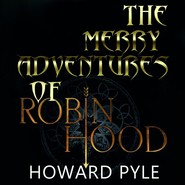По всем вопросам обращайтесь на: info@litportal.ru
(©) 2003-2024.
✖
Within the Capes
Настройки чтения
Размер шрифта
Высота строк
Поля
I will say here, that at the end of a week they had made up their minds to run their chances of what might be found, and that it paid them to do so.
A little later in the morning Captain Williamson and Mr. Winterbury and Jack and Tom went ashore in the captain’s gig. They left the gig and the crew of it a little distance up the beach, while they four walked down to the hut, Tom and Jack carrying a small sea-chest between them, in which to store the money that was hidden under a pile of brush-wood in the cabin. Then they went out on the sand-spit to inspect the wreck, and Captain Williamson renewed the offer that he had made in the cabin of the Baltimore, and said again that they might take a week to think it over.
Then they tore down the breakwater that Tom and Jack had built, so that the sea might make in during the next storm, and so hide the work that they had done. After this they went back to the gig, and Captain Williamson sent four of the men to the hut for the chest of money.
So, at last, their life upon the island came to an end.
They had a safe and quick journey home, entering Sandy Hook on the 20th of the month. They were quarantined for a couple of days through some delay, and landed in New York on the 23d.
During the voyage home, Jack gave Captain Williamson an account of the loss of the Hazlewood. The captain looked very serious over it; he did not say anything, but he shook his head. He evidently thought that it was a very shady piece of business.
The day after they landed in New York, Jack and Tom took stage to Philadelphia, which they reached a little after noon of the 26th.
You all know what followed. The Board of Trade appointed a committee to inquire into the circumstances of the loss of the ship Nancy Hazlewood. Tom did not write a letter home, because he expected that every day would be his last in town; but the investigation dragged along until more than a week had been consumed by the committee.
Both Tom and Jack were blamed, because that they had come off with their lives, while the captain and most of the crew had gone down in the ship. Mr. Blakie, of the firm of Blakie & Howard, said some particularly bitter and cutting things, which might have stung Tom very sharply if he had not felt that, by rights, there was not much blame resting upon him.
Mr. Blakie’s words were meant as much for him as they were for Jack, for it was not known that Tom had been taken off the vessel against his will. Jack did not breathe a word of this, and Tom was too proud to seem to want to slip from under the blame, and leave Jack to bear it all. Jack did not say in so many words that Tom had joined him in deserting the ship in the cutter, but what he did say would have led any reasonable man to infer as much. It is quite natural that a man should dislike to carry all of a load of blame on his own shoulders, and there is a great satisfaction in knowing that others share the burden; at the same time, it would have been a good thing for Tom, if Jack had spoken out and told the whole truth, for, as it turned out, it weighed in the balance against him when every scruple told.
But at last the committee dismissed Tom, and he was free to go; little he cared then of their favorable or unfavorable opinion, for the time had come when he might go home.
There was just time to catch the morning stage for Eastcaster, and in half an hour he was rumbling out of Philadelphia, mounted, pipe in mouth, on the outside of the Union stage, with his boxes and bundles safely stowed away in the boot.
PART III
CHAPTER XIV
IT seemed to Tom, now that he was fairly on the homeward road, as though the wheels of the stage were weighted with lead, and as though the horses that dragged it crawled at a snail’s pace, for his hopes and his longing for home outstripped a thousand fold the rate of his traveling.
To P., 18 M. – 14 M. to E.; to P., 19 M. – 13 M. to E.; to P., 20 M. – 12 M. to E. So passed the milestones in succession, and Tom counted every one as they rumbled by it. But at last it was 2 M. to E., and a steep hill lay in front of them; it was the last hill between him and home.
Tom had taken the Union line of stages, which did not, like the Enterprise line, run on to Downeyville, but stopped at Eastcaster. The driver of “No. 3” was a stranger to Tom; old Willy Wilkes had heretofore driven the stage as long as he could remember.
“Where’s old Willy Wilkes?” said Tom, soon after they had left Philadelphia.
The strange driver let fly an amber stream of tobacco juice over the side of the coach, and answered, briefly, “Dead.”
“Dead!”
“Ya-as. Caught cold last spring and died in June;” then, with some curiosity, “Did you know him?”
“Yes, I knew him,” said Tom, briefly. Here was the first change, and it threw a cloud over him; was he to find other changes as great? He had only been gone a year and a half, but it seemed to him as though it might have been ten years. There was a pause of a few minutes, and the new driver of “No. 3” looked furtively at Tom from out the corners of his eyes. Tom had not cut off his beard, and his hair had turned iron grey in the last five months; he knew that he was greatly changed.
It was Tom’s beard that seemed to catch the driver’s eye, for folks went clean-shaven in those days.
“I allow you’re from foreign parts,” said he, at last.
“Yes; I’m from foreign parts,” said Tom, shortly. Nothing more was said between them after this. Tom sat buried in thoughts and the driver sat chewing vigorously at his quid of tobacco, looking steadfastly over the leader’s ears the whiles.
So they began the slow climbing of the last hill; they reached the top of the rise, and then the country lay spread out before them, hill and valley, field, meadow-land and wood, all brown and golden in the mellow autumn sunlight. The houses clustered more thickly about the village, and over the rusting foliage peeped the white spire of St. James’ Church. A lump arose in Tom’s throat at the sight of the dear old place, and his eyeballs felt hot and dry. Then a keen and sudden thrill shot through him, for, away beyond the village and over to the right, he could see the yellow sunlight shining on the white walls of a house. Close to it stood an old stone mill and back of it was an apple orchard. Then Tom felt, indeed, that his darling was near to him.
The driver gathered up his reins. “Click!” said he, and the coach dashed down the hill, and house and mill were hidden from Tom’s sight. So they reached the level road and went rumbling along it; they turned the corner and Eastcaster was before them. The scattered houses grew thicker and thicker; they turned another corner sharply and were in Market street.
Everything was the same as when Tom had last seen them: trees, houses, stores, people, everything. Shipwreck, death, loneliness and misery had been around him for a year and a half, and yet Eastcaster was the same as though he had not come back to it through the valley of the shadow of death. It seemed strange to him that it should be so; it was as though he had left everything but yesterday. Here was Pepperill’s store, there the blacksmith shop. They passed Parkinson’s tobacco store; a number of men were sitting on chairs around the door in the sunshine. They looked up at the stage with dull interest. Tom knew them all, but not one of them recognized him. A little further along, on the opposite side of the street, was Mr. Moor’s office. As they rumbled by it, Tom saw that two men were standing at the window looking absently into the street; one of them was Mr. Moor, the other was Isaac Naylor. A thrill darted through him when he saw Isaac Naylor; it was strange that the sight of his former rival should seem to bring Patty so near to him. The two men looked at the stage as it passed, but they saw nothing, for their minds were evidently fixed upon other things. Mr. Moor was talking, looking anxious and worried; Isaac Naylor was listening, cold and impassive.
Tom noticed this in the moment that he was passing.
Then the stage stopped, for it was in front of the Crown and Angel, and Black Jim – the identical Black Jim that Tom had left a year and a half ago, who was standing out in the road, waiting the coming of the stage – loosened the straps at the horses’ necks. The passengers tumbled out from the inside, and Tom got down from the box, and stood looking about him. There were a group of loungers sitting along the tavern porch in the warm sunlight; their feet on the railing, and their chairs tilted back. Tom knew nearly all of them, but they did not recognize him; – he never fully realized till then, how changed he was in his appearance. Even Mrs. Bond, the landlady, who was standing at the door with her hands under her apron, did not know him.
Some one came walking along the street and stopped, for a moment, to look at the stage – it was Will Gaines. “He’ll know me, at least,” said Tom, to himself, but he did not; he looked at Tom, but there was no other light than that of curiosity in his eyes.
“Will,” said he, at last; “Will Gaines, don’t you know me?”
Then sudden recognition flashed into Will’s face. He stood for a moment as though bereft of speech; then he strode forward, and clutched Tom by the shoulder.
“My God! Tom Granger; is it – is it you? They said you were dead! I – I – ” Then he stopped, and Tom felt his hands trembling as they lay on his shoulders.
“Dead!” said Tom, after a moment of silence.
“Yes, Tom; dead.”
“But I’m not dead,” said Tom, smiling, and trying to shake off the feeling that was creeping over him.
“Don’t! Don’t talk that way, Tom,” said Will; “don’t make so light of it. Your father had a letter from Lovejoy & Co., of Philadelphia. It was nearly a year ago, now; the letter said that your ship had been lost, no one knew how or where. Tom,” – here he stopped abruptly – “Come into the tavern, Tom,” said he.
As they went up the tavern steps and entered the door, the loungers stared at them with wide-opened eyes. They did not recognize him, but a stranger was an object of interest in the town in those days. Will hurried him into the house, and Mrs. Bond showed them into the parlor. There was something so odd in Will’s manner, that the feeling of fear grew heavier and heavier on Tom’s spirit – the first words that he spoke, were:
“Will, how’s Patty?”
Will did not answer immediately, and Tom, glancing quickly up, saw that he was looking earnestly at him.
There was a moment of dead silence, through which sounded the clicking of the dishes being washed in the out kitchen of the tavern.
“Will, how’s Patty?” said Tom, again, and he himself noticed what a sharp ring there was in his voice. “Why don’t you speak? What’s the matter? How’s Patty?”
“Patty?”
“Yes; Patty.”
“Patty? Oh! Patty’s all right.”
Tom looked at him very keenly. His heart was crumbling within him, though he could not tell why. He felt faint and ill, and leaned heavily on the table near him. He looked out of the window, watching Black Jim watering the stage horses at the trough in the stable-yard; then, without looking back at Will, he steadied himself for the next question.
“I’m no coward, Will,” said he; “you see I’ve gone through enough this year to turn my hair grey, and I’m no coward now, if I ever was before. I want you to tell me the truth; is – is Patty dead?”
“Dead! No; of course she isn’t dead. She was very much broken down when she heard of the loss of the ship that you sailed in; but she’s all right now, – well and hearty.”
“And she’s not sick – nothing the matter with her?”












